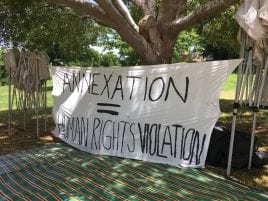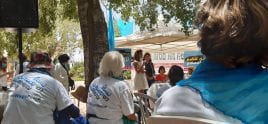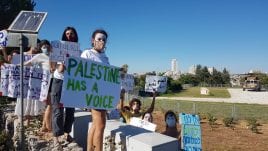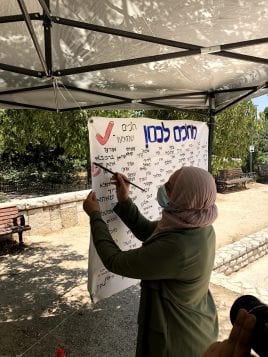
During the Spring 2020 semester, Arava Institute students and interns experienced lock-down together during the most intense months of the coronavirus pandemic between March and June of this year. Since campus life activities had to be limited and adjusted due to social distancing requirements and facilitators’ travel limitations, we had to find creative ways to connect, and educate each other about the Palestinian and Israeli perspectives on the conflict. This included informal, self-facilitated dialogue circles, film screenings, and interactive events to commemorate Israeli Memorial Day and Nakba Day.
In early June, attention on campus centered on the impending annexation of the West Bank, a design of the so-called “Deal of the Century” presented to the region by US President Trump and Israeli Prime Minister Netanyahu. In a community of Americans, Israelis, and Palestinians, the planned annexation could not be ignored. A few students created and facilitated a presentation to explain the Deal and discuss some of the expected outcomes. It was one of the most well-attended student-led presentations of the semester. Students and interns were mainly concerned by the lack of information provided by either the US or Israeli governments on what would happen on the ground, and how these leaders expected the lives of Palestinians and Israelis to change due to the annexation plan. By the end of this first meeting, a group of participants decided to abolish their plans for a post-semester camping trip to the Jordan River, and instead use the time leading up to the July 1st annexation deadline to make our views known to Israeli government and the public. We decided to camp in Jerusalem, in front of the Knesset.
Concurrently with final exams, projects, and moving out of the Institute campus, we drafted a statement of our stance on annexation, and began to connect with other activist organizations, including Women Wage Peace. Our stance is as follows:
- We oppose the annexation.
- The inequality and constant danger Palestinians have to deal with as a result of the occupation is unacceptable and has to change.
- Annexation will make a two state solution impossible and enlarge the security instability in the area.
- The effect on the Palestinians living in the to-be-annexed territory is not mentioned in the annexation plan.
- Palestinians are being treated as a political tool and not as human beings.
- We demand negotiations in any future decision that affects both people.
On June 15th, just five days after leaving the Institute, we met with Arava Institute alumni in Tel Aviv to discuss the motivations for and the logistics of launching a 10-day protest camp outside the Knesset. In addition to the six points listed above, our group established early on that the values of the camp would be demanding peace, encouraging dialogue, and promoting the humanity of all people.
Momentum picked up quickly as participants around the country developed informative materials, acquired necessary equipment and permits, wrote and distributed press releases, and forged connections with other organizations – all within six days.

On June 21st, we established our camp in the Rose Garden with tents, laptops, and a fiery passion for change, ready to get to work. Over the course of the next 10 days, we met with public figures and Knesset members, hosted an event with Women Wage Peace, held workshops with activists of an older generation, and panel discussions/networking sessions with our peers in Peace Now, Hadash, Breaking the Silence, and other groups. We used these conversations to embody the values with which we established the camp. Among the groups also protesting in the Rose Garden was the Yesha Council, representing settler communities in the West Bank. Individuals from our camp and members of the Yesha Council engaged in respectful conversation on topics of human rights, striving for an open dialogue similar to what students and interns experience during the program at the Arava Institue.

On June 25th, ten of the camp’s participants took our message of justice to the streets of Jerusalem. Dressed in eye-catching white to represent peace, we silently carried signs through the market with slogans such as, “Annexation is a human rights violation” and “No to annexation, Yes to peace”. One participant read aloud an open letter to the Israeli public, written by a Palestinian friend. In the letter, the writer speaks beyond leaders of either government to the heart of all people, calling attention to the need for freedom in order to pursue dreams and secure a better life for the next generation on both sides. “I am a human who hates no one”, he says, “I only fight against the occupational powers not against individuals”.

Another highlight of the 10-day experience was the attention given by the media and by Knesset members. Camp representatives gave interviews for Galatz radio, Channel 12, and Knesset TV, and the camp was mentioned in an article about annexation protests in Ha’aretz. We made a special effort to attract members of the Knesset to the camp for dialogue, whether they supported annexation or not. Throughout the 10 days several Knesset members visited and spoke with participants, who checked off their names on a large sign resembling a Bingo scorecard: Iman Khatib-Yasin, Ayman Odeh, Sondos Saleh, Orly Fruman, Tamar Zandberg, Boaz Toporovsky, Yair Golan; and former MKs Mossi Raz and Dov Khenin.
It is mid-July, and annexation on-the-ground is still hard to understand or monitor. Camp participants are maintaining communications and adapting to design sustainable activism in the ongoing cause for peace and justice in the region. Projects include film screenings and a blog, aimed at exposing both Israelis and Palestinians to anecdotes from the other side in order to promote compassion and values of human rights. Though the status quo is not supportive, neither with words nor funding, our group remains motivated; we are part of a generation that refuses the trap of hatred and oppression, and instead insists on cooperation.
Submitted by Amelia Liberatore

